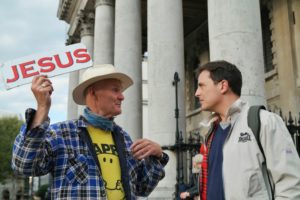As with any hot-button issue, the Atheism/Theism debate is inclined to slants of every direction under the Sun – of Heaven, wherever one’s loyalties might lie.
Misconceptions and blind faith have proven to weaken potentially strong arguments for both sides of the debate. One point that cannot be contested, however, is the fervent difference between Atheism and anti-theism. Just as a Protestant distance himself from Born-Agains, the skeptic can find repugnance in the overtly anti-establishment Atheist.
The Lack of belief in a god or gods
Atheism is quite simply the lack of belief in a god or gods, as strictly defined by strongatheism.net, a leading community for the anti-theism movement which works strongly towards a societal revolution on views pertaining to religion. The prefix and root of the word Atheism make it’s meaning even more clear cut: ‘a’ meaning ‘without’,’theism’ meaning ‘the trust in a deity or deities’. The category of Atheists is so broad, that it is truly illogical to presume every nonbeliever shares in a decidedly unabashed pool of disdain for religion; yet that is not to say that the archetype Atheist will be donating to the Archdiocese anytime soon, but nevertheless, the group does get a pretty bad rap.
 What defining characteristic of the Atheist makes him such a menacing figure? To answer that question, we must delve into the stale, oxidized pages of theological history, where we will find ourselves in a much different place than where our society sits today.
What defining characteristic of the Atheist makes him such a menacing figure? To answer that question, we must delve into the stale, oxidized pages of theological history, where we will find ourselves in a much different place than where our society sits today.
Let us go way back, to a time when the church was the final word and its rule spanned all the land. Men killed and died by their beliefs and found no err in enforcing their agendas on anyone around, just as God laid his heavy hand on every facet of their lives. This era – the Dark Ages – was home to some of the most atrocious acts on humans ever suffered at the hands of another.
To the misguided thinker, a time where the government, policing of states, and everyday commonalities were under the discerning eye and strict jurisdiction of the church would be the most peaceful of epochs, but factoring in the tried and true fact that absolute power corrupts absolutely, we come to a lapse in that perfection.
When control is held through fear, those that resist trepidation seem uninhibited and become dangerous to society.
Such was the case with the feared Atheist of the time. Because he could not be chained by the divine bonds of God, he was thought to be a menace to society, and thus listed as an outcast, a danger, and worst of all, the ultimate sinner. Without a belief in God, there was no morality, nor the dissuasion of eternal suffering as punishment for bad behavior.
A Stigma Remained Attached to the Atheist
Fortunately for the world, the Dark Ages passed, and into the light, the earth once again rose. Yet this horribly skewed stigma remained attached to the Atheist and refused to fade away. To be fair, some countries have begun to actually embrace the freethinker lifestyle in great numbers. Norway, for instance, hovers around the sixtieth-to-seventieth-percentile of nonbelievers in comparison to the measly six percent that is contained within America.
Yet even still, the next step is not to convince the majority of Americans to disavow all of their faith. In fact, that is the last thing Atheists want. Blind faith is “Thou shalt not numero uno” for the skeptic, and having 270,000,000 jump ship would prove simply disastrous for the cause. Rather, the nation as a whole needs to extinguish the shroud of mystery and fear that invariably materializes with the mere mention of a skeptic. Just as we have worked to eliminate the negative stereotypes associated with countless other minorities, it is high time that we directly address the maltreatment of the freethinkers in our society and make adjustments for equality.






